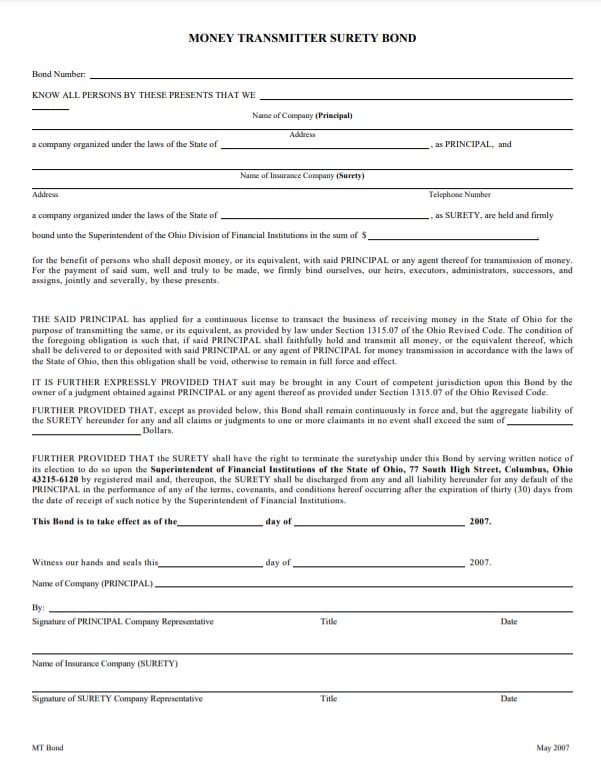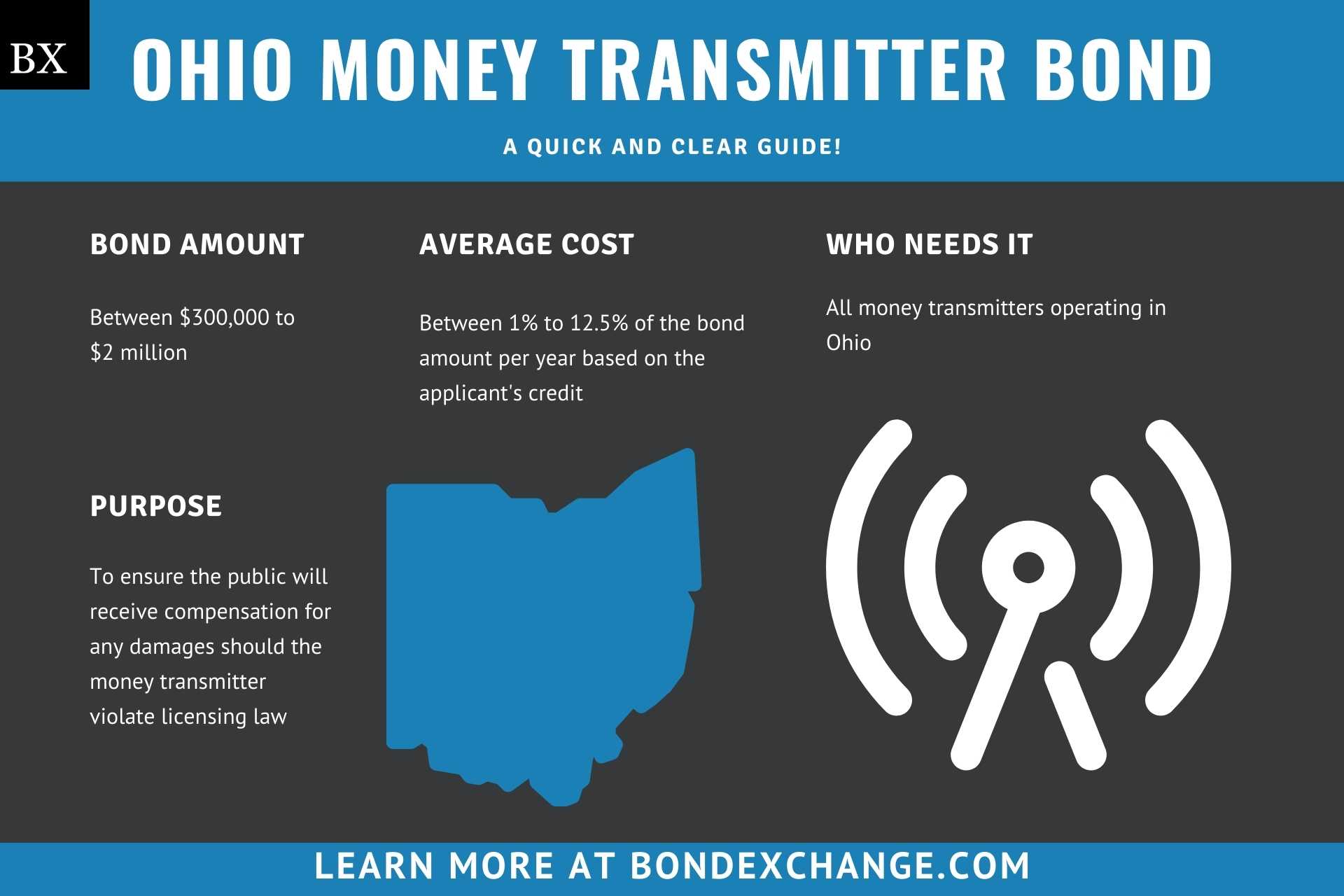Ohio Money Transmitter Bond: A Comprehensive Guide
This guide provides information for insurance agents to help their customers obtain Ohio Money Transmitter Bonds
At a Glance:
- Lowest Cost: $3,000 per year or $300 per month based on the applicant’s credit
- Bond Amount: Between $300,000 to $2 million (more on this later)
- Who Needs it: All money transmitters operating in Ohio
- Purpose: To ensure the public will receive compensation for any damages should the money transmitter violate licensing law
- Who Regulates Money Transmitters In Ohio: The Ohio Division of Financial Institutions

Background
Ohio statute 1315.02 requires all money transmitters operating in the state to obtain a license with the Division of Financial Institutions. The Ohio legislature enacted the licensing laws and regulations to ensure that money transmitters engage in ethical business practices. In order to provide financial security for the enforcement of the licensing law, money transmitters must purchase and maintain a surety bond to be eligible for licensure.
What is the Purpose of the Ohio Money Transmitter Bond?
Ohio requires money transmitters to purchase a surety bond as part of the application process to obtain a business license. The bond ensures that the public will receive compensation for financial harm if the money transmitter fails to comply with the regulations set forth in Ohio statute 1315. Specifically, the bond protects the public in the event the money transmitter engages in any acts of fraud or fails to transmit money owed to consumers. In short, the bond is a type of insurance that protects the public if the money transmitter breaks licensing laws.
How Can an Insurance Agent Obtain an Ohio Money Transmitter Surety Bond?
BondExchange makes obtaining an Ohio Money Transmitter Bond easy. Simply login to your account and use our keyword search to find the “money” bond in our database. Don’t have a login? Gain access now and let us help you satisfy your customers’ needs. Our friendly underwriting staff is available by phone (800) 438-1162, email or chat from 7:30 AM to 7:00 PM EST to assist you.
At BondExchange, our 40 years of experience, leading technology, and access to markets ensures that we have the knowledge and resources to provide your clients with fast and friendly service whether obtaining quotes or issuing bonds.
Not an agent? Then let us pair you with one!

Click the above image to find a BX Agent near you
How is the Bond Amount Determined?
Ohio statute 1315.07 dictates that the limit on the Ohio Money Transmitter Bond be a minimum of $300,000. The statute also grants the Division of Financial Institutions the authority to increase the bond amount to a maximum of $2 million if they so choose. When determining whether to increase the bond limit, the division will examine factors such as the money transmitter’s financial responsibility and their total volume of money transferred.
Is a Credit Check Required for the Ohio Money Transmitter Bond?
Surety companies will run a credit check on the owners of the credit money transmission company to determine eligibility and pricing for the Ohio Money Transmitter bond. Owners with excellent credit and work experience can expect to receive the best rates. Owners with poor credit may be declined by some surety companies or pay higher rates. The credit check is a “soft hit”, meaning that the credit check will not affect the owner’s credit.
How Much Does the Ohio Money Transmitter Bond Cost?
The Ohio Money Transmitter Bond can cost anywhere between 1% to 12.5% of the bond amount per year. Insurance companies determine the rate based on a number of factors including your customer’s credit score and experience. The chart below offers a quick reference for the approximate bond cost on a $300,000 bond requirement.
$300,000 Money Transmitter Bond Cost
| Credit Score | Bond Cost (1 year) | Bond Cost (1 month) |
|---|---|---|
| 720+ | $3,000 | $300 |
| 680 – 719 | $4,500 | $450 |
| 650 – 679 | $6,000 | $600 |
| 600 – 649 | $12,000 | $1,200 |
| 550 – 599 | $22,500 | $2,250 |
| 500 – 549 | $37,500 | $3,750 |
How Does Ohio Define “Money Transmitter?”
Ohio statute 1315.01 defines a money transmitter as any business entity who receives money for transmission or who sells checks or payment instruments.

BondExchange now offers monthly pay-as-you-go subscriptions for surety bonds. Your customers are able to purchase their bonds on a monthly basis and cancel them anytime. Learn more here.
How do Money Transmitters Apply For a License in Ohio?
Money transmitters in Ohio must navigate several steps to secure their license. Below are the general guidelines, but applicants should refer to the NMLS’s application guidelines for details on the process.
License Period – The Ohio Money Transmitter License expires on December 31 of each year and must be renewed before the expiration date
Step 1 – Meet the Net Worth Requirement
Applicants for the OHio Money Transmitter license must maintain a company net worth (assets – liabilities) of at least $500,000. Money transmitters must submit audited financial statements verifying their net worth with their license application.
Step 2 – Purchase a Surety Bond
Money transmitters must purchase and maintain a surety bond with a minimum limit of $300,000
Step 3 – Request a NMLS Account
The Ohio Money Transmitter License application is submitted electronically through the Nationwide Multistate Licensing System (NMLS). To submit a license application, applicants must first request to obtain an NMLS account.
Step 4 – Complete the Application
All Ohio Money Transmitter License applications can be completed online through the NMLS. Applicants must complete the entire application, and submit the following items:
-
- Audited company financial statements indicating a net worth of at least $500,000
- Names and locations of all company authorized agents
- The following company contacts:
- Primary
- Primary consumer complaint
- Licensing
- Exam Billing
- Pre-Exam Contact
- Companies FinCEN registration confirmation number and filing date
- Names and addresses of all banks holding clearing accounts used in the money transmitter’s business
- Disclosure questions
- Company’s AML/BSA policy as well as an independent review of said policy
- Detailed company business plan
- Pro forma (next two years) company financial statements
- Certificate of Good Standing
- Company staffing and internal policies
- Flow of funds structure
- Company formation documents
- Management chart detailing the company’s hierarchy
- Organizational chart detailing the company’s ownership structure
- Verification of experience for the company’s compliance officer
- Financial statements for the company’s parent organization (if applicable)
- Third-party security audit of the company’s IT systems (only needed if virtual currency is transmitted)
- Confidential treatment request (if applicable)
- Capital plan
- Statement regarding all Ohio based business activity
Money transmitters must pay the following fees when submitting their license application:
-
- $5,000 licensing fee
- $36.25 background check fee (per person)
- $0.25 annual fee (capped at $25,000) per company authorized agent (the first 100 agents are exempt)
How Do Ohio Money Transmitters Renew Their License?
Money transmitters can renew their license online through the NMLS. License holders need to simply login to their account to access their renewal application. The Ohio Money Transmitter License expires on December 31 of each year and must be renewed before the expiration date.
What Are the Insurance Requirements for the Ohio Money Transmitter License?
Ohio does not require money transmitters to purchase any form of liability insurance as a prerequisite to obtaining a business license. Money transmitters must purchase and maintain a surety bond with a minimum limit of $300,000.
How Do Ohio Money Transmitters File Their Bond?
Money transmitters should submit the completed bond form, including the power of attorney, electronically through the NMLS. The surety bond requires signatures from both the surety company that issues the bond and a representative from the money transmission company. The surety company should include the following information on the bond form:
- Name and address of entity/individual(s) buying the bond
- Surety company’s name, address, and phone number
- Date the bond goes into effect
- Date the bond is signed
What Can Ohio Money Transmitters Do to Avoid Claims Against Their Bond?
To avoid claims on their bond, money transmitters in Ohio must ensure that they follow all license regulations in the state, including some of the most important issues below that tend to cause claims:
- Do not engage in any acts of fraud
- Transmit all funds owed to consumers
What Other Insurance Products Can Agents Offer Money Transmitters in Ohio?
Ohio does not require money transmitters to purchase any form of liability insurance as a prerequisite to obtaining a business license. However, most reputable businesses will seek to obtain this insurance anyway. Bonds are our only business at BondExchange, so we do not issue other types of insurance, but our agents often utilize brokers for this specific line of business. A list of brokers in this space can be found here.
How Can Insurance Agents Prospect for Ohio Money Transmitter Customers?
The NMLS conveniently provides a public database to search for active money transmitters in Ohio. The database can be accessed here. Contact BondExchange for additional marketing resources. Agents can also leverage our print-mail relationships for discounted mailing services.
